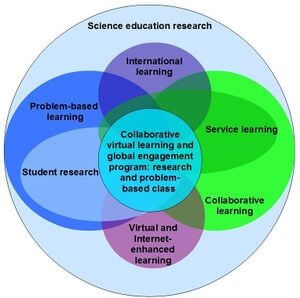
Increasingly international competence is considered and important skill to be acquired from an undergraduate education. Because international exchange presents a challenge to many students, there is a need to develop and implement alternative means for incorporating international and cross-cultural experiences into the undergraduate classroom. We report on the implementation of a semester-long, virtually-shared course offering between a U.S. and a Bolivian university. Since STEM (science, technology, engineering and mathematics) majors tend to be under-represented in study abroad programs, this class sought to provide a multidisciplinary experience that could be relevant to both hard and social science majors. Furthermore, the relevance and learning impact of this class was enhanced through the incorporation of a service-learning component in conjunction with a rural Bolivian partner organization. The results of this experience show that virtually-shared class-room experiences can successfully facilitate international experiences for undergraduate students.





